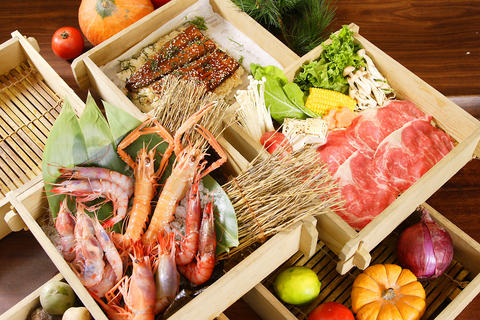Last year there were two restaurants called Wasabi on the fourth floor esplanade in Taipei 101. One, an all-you-can-eat buffet, still goes by that name. The other, a sushi bar and restaurant, has reinvented itself as Mihan 101, after the Mihan Honken restaurant in the Grand Formosa Regent hotel. The sushi bar remains, as do many a la carte selections such as tempura, but the focus now lies on food cooked at the table: shabu shabu, sukiyaki and steamers.
The latter option is being promoted until Aug. 31 with Mihan 101's "Summer Steamer Trio" (NT$1,880), a set menu for two with three steamed presentations and a variety of smaller dishes. The executive chef of Mihan 101, Tomi Wang (王祥富), explained that each of his steamed courses showcases a summer flavor: grapefruit, seaweed and perilla. Also served at appropriate intervals were fresh tofu with sesame and seafood, an appetizer trio of salmon, maguro (tuna) and prawn sashimi, soup, and fruit sorbet for dessert. Everything was simple and light, the kind of food you want on a hot summer day. The salmon and maguro, though common varieties of sashimi, impressed me as being among the freshest I've had in Taipei.
Each time the waitress placed a wooden steamer on the range in the middle of my table, Wang lifted the top and invited me to smell the fragrance that emerged as the food gently cooked. "This is grapefruit," he explained as he uncovered the first steamer, prime US rib-eye steak, cabbage and greens. "Can you smell the seaweed?" he asked as he cracked the lid on the second, shrimp and slices of fish. "This is perilla," he said, referring to the leaf that infuses the third steamer, Japanese salt-water eel sliced over rice, with a tinge of mint.

PHOTO: COURTESY OF MIHAN 101
Local ingredients were the stars of this meal. The perilla, which is often wrapped around sashimi, is grown in Yangmingshan. The fish and shrimp come from Turtle Island near Dahsi (大溪) in Ilan County, arriving an hour and a half after being loaded onto trucks at the port thanks to the recently completed Hsuehshan Tunnel. I especially liked the second course with its sweet red shrimp (胭脂蝦) and dolphin fish (鬼頭刀), which is perfect for steaming because it explodes on the palette and would be ruined in a stir-fry or soup. My only reservation was the final steamer: the slices of eel on rice seemed like a let down after the steak and fresh seafood.

On April 26, The Lancet published a letter from two doctors at Taichung-based China Medical University Hospital (CMUH) warning that “Taiwan’s Health Care System is on the Brink of Collapse.” The authors said that “Years of policy inaction and mismanagement of resources have led to the National Health Insurance system operating under unsustainable conditions.” The pushback was immediate. Errors in the paper were quickly identified and publicized, to discredit the authors (the hospital apologized). CNA reported that CMUH said the letter described Taiwan in 2021 as having 62 nurses per 10,000 people, when the correct number was 78 nurses per 10,000

May 5 to May 11 What started out as friction between Taiwanese students at Taichung First High School and a Japanese head cook escalated dramatically over the first two weeks of May 1927. It began on April 30 when the cook’s wife knew that lotus starch used in that night’s dinner had rat feces in it, but failed to inform staff until the meal was already prepared. The students believed that her silence was intentional, and filed a complaint. The school’s Japanese administrators sided with the cook’s family, dismissing the students as troublemakers and clamping down on their freedoms — with

As Donald Trump’s executive order in March led to the shuttering of Voice of America (VOA) — the global broadcaster whose roots date back to the fight against Nazi propaganda — he quickly attracted support from figures not used to aligning themselves with any US administration. Trump had ordered the US Agency for Global Media, the federal agency that funds VOA and other groups promoting independent journalism overseas, to be “eliminated to the maximum extent consistent with applicable law.” The decision suddenly halted programming in 49 languages to more than 425 million people. In Moscow, Margarita Simonyan, the hardline editor-in-chief of the

Six weeks before I embarked on a research mission in Kyoto, I was sitting alone at a bar counter in Melbourne. Next to me, a woman was bragging loudly to a friend: She, too, was heading to Kyoto, I quickly discerned. Except her trip was in four months. And she’d just pulled an all-nighter booking restaurant reservations. As I snooped on the conversation, I broke out in a sweat, panicking because I’d yet to secure a single table. Then I remembered: Eating well in Japan is absolutely not something to lose sleep over. It’s true that the best-known institutions book up faster